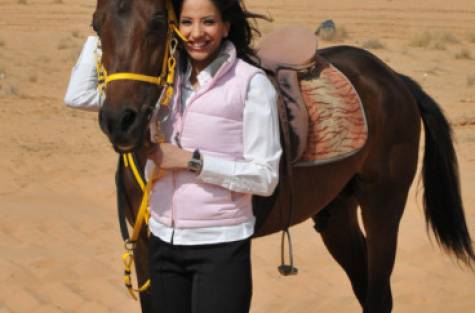
She could be the first Saudi women equestrian rider to take part in this month’s Olympic Games in London.
Her name was mentioned, by some activists, as a woman with a good chance. But Alia Abutayah Alhwiti refused to confirm or deny.
Alia, who is currently pursuing her master degree in political science in London, said should anybody ask her to participate, “she is ready”.
Alia, who dodged the issue of her age with a laugh, said she has been riding horses since she was five years’ old. At first in her family ranch, and then she received professional training from British, Jordanian and other Arab trainers.
She participated in several events starting from 1997 in different Arab countries. She won the dressage medal in 1998, and reached an advanced position in several other competitions, including endurance or long distance races.
Asked whether she will participate in the Olympics, Alia responded, “There are things I would like to keep for myself” and “there is still a hope”.
Alia, who comes from a well-known tribe in the Arabian Peninsula, added “if she is to be given the honour to represent her country (in the Olympics) she will be honoured to accept it. Otherwise, she will continue loving horses.”
Saudi Arabia has announced last month that it will allow women to participate in this month’s international games.
“Saudi Arabian Olympic Committee will oversee the participation of women athletes who can qualify for the Games,” said a statement issued by the Saudi embassy in London.
The decision was welcomed by Saudi women activists, who expressed their hope that it will be followed by other moves including encouraging women sports inside the Kingdom.
All eyes were directed at the 20-year-old equestrian rider Dalma Malhas, who was looked at as a qualified Saudi women who could win another medal to her country.
However, these hopes were dashed after her horse was injured therby preventing her from participating.





Comments
Add new comment